
HAIL OF BULLETS – Advancing Once More
Anthony Morgan
February 2011
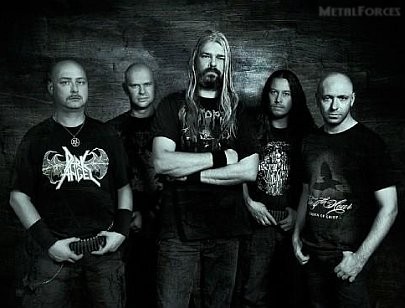
|
Amersfoort, Netherlands-based outfit Hail Of Bullets formed during late 2006, Stephan Gebédi (Thanatos) approaching vocalist Martin van Drunen (Asphyx / ex-Pestilence / ex-Bolt Thrower), drummer Ed Warby (ex-Gorefest), bass player Theo van Eekelen (ex-Thanatos) and guitarist Paul Baayens (Thanatos) with the idea of founding an old school death metal act. “I had the idea to form a band like this many years ago, but it never happened because everybody had too tight schedules with their other bands like Asphyx and Gorefest, and the other guys were still also doing other bands,” Stephan Gebédi remembers, Hail Of Bullets’ guitarist and founder. “I also wasn’t sure about who should be in the band or not, but anyway, we played a show with my other band Thanatos near the German border and the support band at the show was a band called Death By Dawn from Germany. They were fronted by Martin van Drunen at the time, and we talked about the old days.
“I said ‘I’ve got this idea to put together a band with people from various Dutch bands, and you’re obviously the best singer we’ve ever had in Holland, so do you wanna join?’ He said ‘Well, it seems like a good idea’, and then a couple of months later we got together with the other guys. Most of them I already knew from previous bands or they were just friends of mine; Paul and Theo have been in Thanatos at various points, and Ed was one of my buddies with whom I watched a lot of horror movies in the past. Us five people got together, and we just chose a pub somewhere in Amersfoort, a city in Holland. We started drinking, getting drunk and talking about who we were gonna take influence from, bands like Massacre, Autopsy, Bolt Thrower. We said ‘We wanna do something like this’, and before we knew it we had a band. The next day when we got sober, we still felt that it would be a good plan. We just took it from there.”
Hail Of Bullets’ name hints towards the Dutch contingent’s war-themed lyrics. “We literally went through hundreds and hundreds of names, but everything that sounded pretty cool was already taken,” the axeman notes. “Obviously we really wanted to go for a consistent one-word name or something, but there was nothing really left to take. We went through a lot of other names, and then I think Ed came up with Hail Of Bullets. We already had in mind that a lot of the lyrical topics might be about war, so I think Hail Of Bullets was pretty suitable for the kind of music and lyrics we had in mind. Yeah, it sounded fairly cool so we took it.”
In July 2007, Hail Of Bullets cut a four-song demo. “We did the recordings ourselves basically; we went into a local studio here in Rotterdam, and then Dan Swanö did the mixing and mastering,” Stephan informs. “I think when we started, it was planned that me and Paul would write most of the material, and especially Ed – who was still in Gorefest back then – said ‘Well, I’m not sure if I’ve got enough time for this. Maybe I can add a few ideas, but yeah, I don’t know.’ All of a sudden though, he came up with the most riffs and most songs; he already had something like five to six songs written, so we took three to four of his songs and one of mine and one of Paul’s I think.
“We recorded four of those as a promo, a demo-CD, and we sent it off to a couple of select labels because we had the idea that we had something good going on. We got a good line-up and we definitely wanted to have a record out, but we didn’t want to have it out with some shitty label like I’ve been through in the past with some of my other bands. We sent the demo to a really select few labels like Metal Blade, Nuclear Blast and a few more, and yeah, we were really surprised that four to five of those labels actually showed interest and they were really serious about signing us. We were able to take our pick from those labels and it felt pretty cool to go with Metal Blade, and so far we have no regrets about that.”
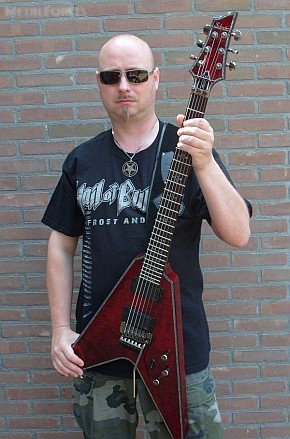
|
November 23rd, 2007 was the date that Hail Of Bullets’ record contract with Metal Blade Records was publicly announced. “Metal Blade has some kind of history for old farts like us, releasing the first Slayer album (1983’s Show No Mercy) and all the albums they released afterwards,” the guitarist reminisces. “We brushed aside a label that was maybe even a little bigger than Metal Blade because the guys who signed us from Metal Blade’s European branch really came across as being fans of the music and really liking the band. We also had the idea that with Metal Blade Records we wouldn’t be a number, one of the smaller fishes in a very big sea with numerous bands on the label. They also told us we would be a priority band for them, and so far they’ve really kept their word. We actually signed to Metal Blade Europe at first, and then a few months later we got word from Metal Blade USA that they wanted to do a worldwide deal. We took that into consideration as well, and after awhile we decided to go with them for a worldwide deal as well. So far they’ve been doing a great job, especially the people in Europe and Andy (Turner) in the UK who’s also doing a great job. It’s all pretty cool.”
Recorded in February-March 2008 at Excess Studios in Rotterdam, Holland and mixed and mastered in Sweden by Dan Swanö with production from drummer Ed Warby, … Of Frost And War was issued in May of that year. “When we first started the band, we weren’t sure about how much time we could put into the band because of the other bands,” Stephan discloses. “When we put the album out the reactions and the reviews were obviously very cool, very great; the reactions and the reviews from the fans and the press were awesome, and we got a lot of offers for shows. We started playing more and more live, and I think within a year of releasing our debut album it turned more from being some sort of project-based thing to becoming a real band. I think we decided then that there was something really good going on, and more shows followed. We decided to make more than just one record from that point I guess, but the reactions to the first album were good.
“It’s basically what we had in mind, I guess we wanted to play the kind of death metal that we grew up with, the bands that had influenced us to start playing death metal in the first place. I started out with a death / thrash metal band in ’84, ’85, and we went along with that first wave of real death metal which came along. Obviously we took our influences from those bands as well, and the same goes for Gorefest and Pestilence and Asphyx when they were formed. The bands who really started it for us are still the ones who we love most; although I really like some of the newer bands, when I put on a death metal album it’s usually something like the first Autopsy record or the first Death records or something like that.
“Yeah, we wanted to play in that direction, and I think there was a big gap in the current death metal scene because we were in the middle of some pissing contest with everybody trying to be the fastest and the most brutal band around. There’s nothing wrong with being fast and brutal, but some of those bands really started to sound alike a lot to me. I think we kind of filled a gap that was there between the old school bands that didn’t play anymore or didn’t release any albums, and the very brutal American-style death metal that was going on at that moment. We went back to the origins of death metal, and we tried to record and play in that style.”
So bands like Death, Deicide and Suffocation were influences then Stephan? “Yeah, although we don’t use blast-beats in our music; the first bands that we grew up with just had the polka beats, the mid-tempo and the double-bass stuff. Although we’ve thought about incorporating some blast-beats in the Hail Of Bullets sound, we felt that it wouldn’t fit. We just went for the old school death metal approach without the really fast parts and just mid-tempo, some uptempo stuff here and there, and more of the slow, grinding stuff with a good groove in it. The most important thing for us is the song; we wanna write good songs, and not just be the fastest or the most brutal or the most low-tuned band around. That’s the most important thing for us, to write memorable songs and good, catchy riffs.”
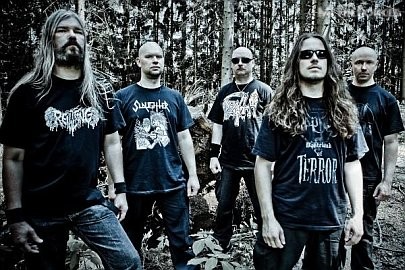
|
Mid-tempo death metal factions who influence Hail of Bullets include Massacre and Bolt Thrower. “Most of the pre-death metal bands like Celtic Frost and Possessed are really big influences on our sound as well, and I think a lot of people have compared us to old Massacre, old Bolt Thrower – we can’t deny that,” the axeman admits. “It’s a big compliment as well. They’re the bands that we really love, and that’s the type of death metal that we really love to hear. The only thing we didn’t wanna do was sound like a retro band or something, going for an 80s production or something like that because that’s bullshit. We live in 2011 now so we use the techniques and sounds that we can get now, but that doesn’t mean you cannot sound old school and have a good, brutal sound that’s up to date. I think that’s the most important thing that we do; we play old school style death metal, but we have up to date sounds with it.”
Modern metal elements are conspicuously absent from Hail Of Bullet’s musical offerings, however. “We don’t do anything from the modern style – we don’t use breakdowns or shit like that,” Stephan chuckles. “We try to strive away from things that do not belong in death metal. I think death metal is a pretty strict type of music – as far as I’m concerned at least – and I don’t wanna mix it with any other sorts of metal, at least not with this band (laughs). That’s not the idea we had with Hail Of Bullets – it’s just pure old school death metal.”
You sound as though you aren’t happy with some of the new death metal bands Stephan? “I know some of those. I know the deathcore bands like Suicide Silence and Bring Me The Horizon, but I’m not too much into it – it’s more the things we wanna stay from very much. It’s not really our cup of tea; people can like it, but it’s not what we wanna be associated with.”
… Of Frost And War details battles fought on the Eastern Front during World War Two, a lyrical concept vocalist Martin van Drunen is solely responsible for. “He was already thinking about doing a concept album about World War Two – especially the Eastern Front – before he was in this band.” the Hail of Bullets founder reveals. “He said ‘I’ve always had this idea of doing an album entirely about the Eastern Front’, the battles between the Russians and the Germans during World War Two. When he heard the first couple of songs we had written for this band, he said ‘Wow, this is the thing I’ve been waiting for. This is the perfect soundtrack for what I have in mind. It’s time to get this whole story out of my system, and put it to music.’ Yeah, we decided to make it a concept album about that part of World War Two. He did it in chronological order, and I think he came up with a great thing. We tried to combine everything, like getting the artwork focused on that as well and the music and the lyrics and putting it all together as one big thing. I think a lot of people really like the idea that they were a little bit drawn into the story by the music and the lyrics, and when people have said that they really felt they were in the middle of one of those battles it’s the best thing we’ve heard about it.
“Martin based his lyrics on historical facts, and he also took of course the atrocities of war. They were really taken from a human point of view, and we tried to make the lyrics so that you can see things from both sides. The first couple of tracks are more from the point of view of the Germans I guess when they went to Stalingrad and they got defeated, which was a big turning point in World War Two I think. You then get more of the point of view from the Russians, so we didn’t take any stance. We didn’t have any political message with the songs, but we tried to base the album on historical facts and also incorporate some of the brutality and misery that went on in those big battles, trying to get that feeling across a little bit.”
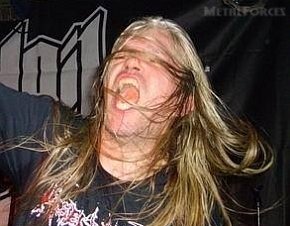
|
Released in limited quantities of 2,000 copies in July 2009, EP Warsaw Rising contained two brand new tracks in ‘Liberators’ and ‘Warsaw Rising’, a rendition of Twisted Sister’s ‘Destroyer’ and three live interpretations in the form of ‘Red Wolves Of Stalin’, ‘Nachthexen’ and ‘The Crucial Offensive’. “We had actually started writing songs for the second album,” Stephan reports. “Martin said, ‘I really forgot to include the Warsaw uprising on the first album. I really would like to do another song about that time, but it won’t fit on the next album because we wanna focus on a little different point in the Second World War on that.’ We said, ‘Well, you have been talking about maybe putting out an EP with one cover tune and maybe some more tracks and a few live tracks.’ He said, ‘I really wanna do one more song about the Poland and Warsaw thing’, so we put that on the record. We made it the title track, and we made one pretty neutral song about some bomber planes (‘Liberators’), and we did a Twisted Sister cover of ‘Destroyer’.
“We were thinking about a suitable cover, and we went through all kinds of things like Venom, Motörhead. Everybody had disagreements; one of us wanted to do this song, and the other one that song. All of a sudden we then came across ‘Destroyer’ by Twisted Sister; we all liked that song, and so we wanted to make a brutal, slow Hail Of Bullets death metal version of it. We thought it would be pretty cool, so we put that on the EP as well. The EP was like an in-between thing, and after the release of that one we started concentrating on the second full-length album.”
Lyrically speaking, is it possible Hail Of Bullets might write about other wars like the First World War, Vietnam, the Iraq War, or whatever? “Yeah, yeah, it’s possible,” the band’s founder confirms. “We’re not sure yet what we’re gonna do with the next album – we might even decide that it won’t be another concept album. It can be about anything; it can be about wars that are actually going on right now, like all the shit that’s happening in the Middle East – it could be a big thing for the next album. We could also go back to another part of World War Two or to World War One though. I don’t know. We’re not limiting ourselves to the Second World War, but on the other hand there’s a lot of things still left untold about that. There’s many battles that haven’t been written about but we could also approach it from a different angle I guess with the next album, but could focus on a particular person or a particular thing that went on in history.
“I don’t know yet. We still have to think about that, but it’s too early to think about that because we just released our second album actually (laughs). It will be war-related though, I guess. I think with Hail Of Bullets we decided to go for lyrics that at least touch upon an aspect of war, but we can approach it from different sides. It doesn’t have to be a chronological concept every time, but it won’t be a band that will be singing about gore or Satan. That’s cool for other bands and also for the other bands we’re in, but not for this band.”
Chronicling the Pacific battles between Japan and the USA during World War Two, second full-length On Divine Winds arrived in October 2010 through Metal Blade Records. “We started writing the album pretty shortly after the Warsaw Rising EP; we got five to six songs finished pretty soon, and then we got stuck a little bit,” Stephan confesses. “Martin then had a bit of a writer’s block with the lyrics, so at the end we were a little bit rushed to get the last couple of things finished. But yeah, it all went pretty well. We tried to musically not stray away too much from the style we had developed but we also didn’t wanna make an … Of Frost And War Part Two, so I think the album turned out a little bit different. We also have a different topic this time – it’s about the Pacific theatre.
“Where the first album really had to get this cold feeling of despair and the battles on the Eastern Front, this second one is a bit more epic I think. It’s more about battles in the sky with bombs, kamikaze pilots and the bombings of Tokyo and shit like that, so it’s a different approach with different lyrics and the songs also sound a bit different. This time we had some of the lyrics written already when we were still writing the music. With the songs that hadn’t been written yet, we tried to continue the story that we already had with some of the finished songs. I think this time the music and the lyrics went a little bit more hand-in-hand than on the first one, where the music was mostly already written when the lyrics came. This time I think the songs sound a little bit more epic and a little bit more melodic but still very heavy, very death metal. It’s a different album, but still Hail Of Bullets.”
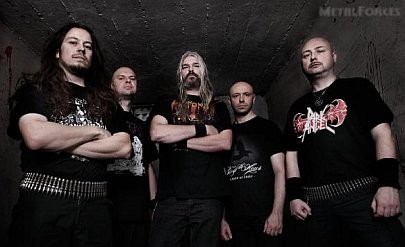
|
… Of Frost And War initially speaks from a German perspective, and then subsequently from a Russian perspective. On Divine Winds doesn’t follow that same lyrical path, however. “There’s not so much to be told from the Japanese perspective I think because there’s not that much known from their point of view,” the guitarist concludes. “They’re more closed about it and there’s not so much documentation about it, so we tried to put things across as objectively as possible and just tried to tell about the atrocities that involved the Japanese and also the Americans of course – the bombings of Tokyo with napalm etcetera. We tried to get those things across as well, but when you look at this story there’s not so much sympathy going out for what the Japanese did I guess. We tried to keep it as objective as possible.”
Mick Koopman designed On Divine Winds’ album artwork, as was the case with … Of Frost And War. “He got some of our lyrics, and we said ‘We want an epic cover. We have songs about kamikazes, bombings, the air wars, the sea wars and things like that’,” Stephan divulges. “This is basically the first thing more or less he came up with, and we said ‘Wow, this is pretty good already.’ He took it from there and made some small adjustments, and he altered the colours a little bit and some things. Basically this was more or less the first concept he came up with for the album though, and we liked it very much. With the first album we had some more options to choose from, but I think he pretty much knew what we wanted to have for the album cover.
“He came up with a good first concept. He’s done everything so far; the guy’s a good friend of ours, and he’s a good artist. Yeah, he’s just a friend of the band; we just started off with him, and he knows exactly what we want now. Why should we go find another artist with a totally different style? He really knows about our concept and knows what we want, and actually develops stuff that we really want. I guess we’ll be using him for our next record as well (laughs), unless we come up with something totally different. We’ll see.”
Drummer Ed Warby, meanwhile, produced. “The first record was produced in Excess Studios in Rotterdam really,” the axeman concedes. “That’s a good local studio, and then we sent off all the stuff to Sweden where Dan Swanö mixed it. With the first album we more or less produced it ourselves, and so Ed our drummer bought some home recording equipment and he made a home studio. We did the drums and vocals in a normal studio but the guitars and bass were recorded at his place, and he produced them more or less because he’s a very sceptical and very perfectionist type of person. I think we took a lot of time to record stuff over there, but there was no rush and no time pressure like you have in an actual studio. We did have that with the drums and the vocals, but they were recorded quite quickly and we took a lot of time with the guitar arrangements and everything like that. It was more relaxed and easy to do it at his home studio than go into another studio for two to three weeks and get everything rushed on tape, and then have to live with certain things we might not be totally happy with. We like this way of doing it and yeah, it’s a good thing to do it that way. We combine the old school studio for the drums and the vocals with the ProTools thing for the guitars.”
Mixing and mastering duties were yet again handled by Dan Swanö (Opeth, Evergrey, Therion, Katatonia, Marduk). “He loves to work alone, so he does the mixing just on his own and then he sends us the result,” Stephan relates. “We say ‘We don’t like this’, ‘We don’t like that’, ‘We want this a little bit different and that a little bit different’ and then we have contact over the phone and by email. He then goes back and makes another mix or another master, and then it goes on like that for seven or eight mixes. His studio is very small, so he says ‘It doesn’t work for me with three to four people all together in a small room bitching about this and bitching about that.’ He likes doing it his way and it works totally well, so he’s a cool guy to work with. He’s easygoing and he really listens to what we say and what we want, and basically he gives our ideas the best form and the best sound that we can possibly ask for.”
On Divine Winds was released on October 12th, 2010 in North America and one day earlier internationally, all through Metal Blade Records.
Interview published in February 2011
Related Posts via Categories
- SCOTTISH SICKNESS – A Report On The Scottish Death Metal Scene, Featuring BRAINBATH, PUTRID FATE And RANCID CADAVER (October 2022) | Features / Interviews @ Metal Forces
- LARVAE – Join The Hardcore Cult! (June 2022) | Features / Interviews @ Metal Forces Magazine
- TRENCH FOOT – Sacrificing Morals For Gory Obscenities (June 2022) | Features / Interviews @ Metal Forces Magazine
- L.A. GUNS – Trigger Happy (March 2019) | Features / Interviews @ Metal Forces Magazine
- CANCER – Crimes So Evil (November 2018) | Features / Interviews @ Metal Forces Magazine
- U.D.O. – The Tank Drives On (August 2018) | Features / Interviews @ Metal Forces Magazine
- SIEGE OF POWER – Bleeding For The Cause (August 2018) | Features / Interviews @ Metal Forces Magazine
- MOONSPELL – A Taste Of Live Eternity (August 2018) | Features / Interviews @ Metal Forces Magazine
- MONSTROSITY – Dark Matter Invocation (August 2018) | Features / Interviews @ Metal Forces Magazine
- SATAN – Five Magicians (August 2018) | Features / Interviews @ Metal Forces Magazine
|
|





